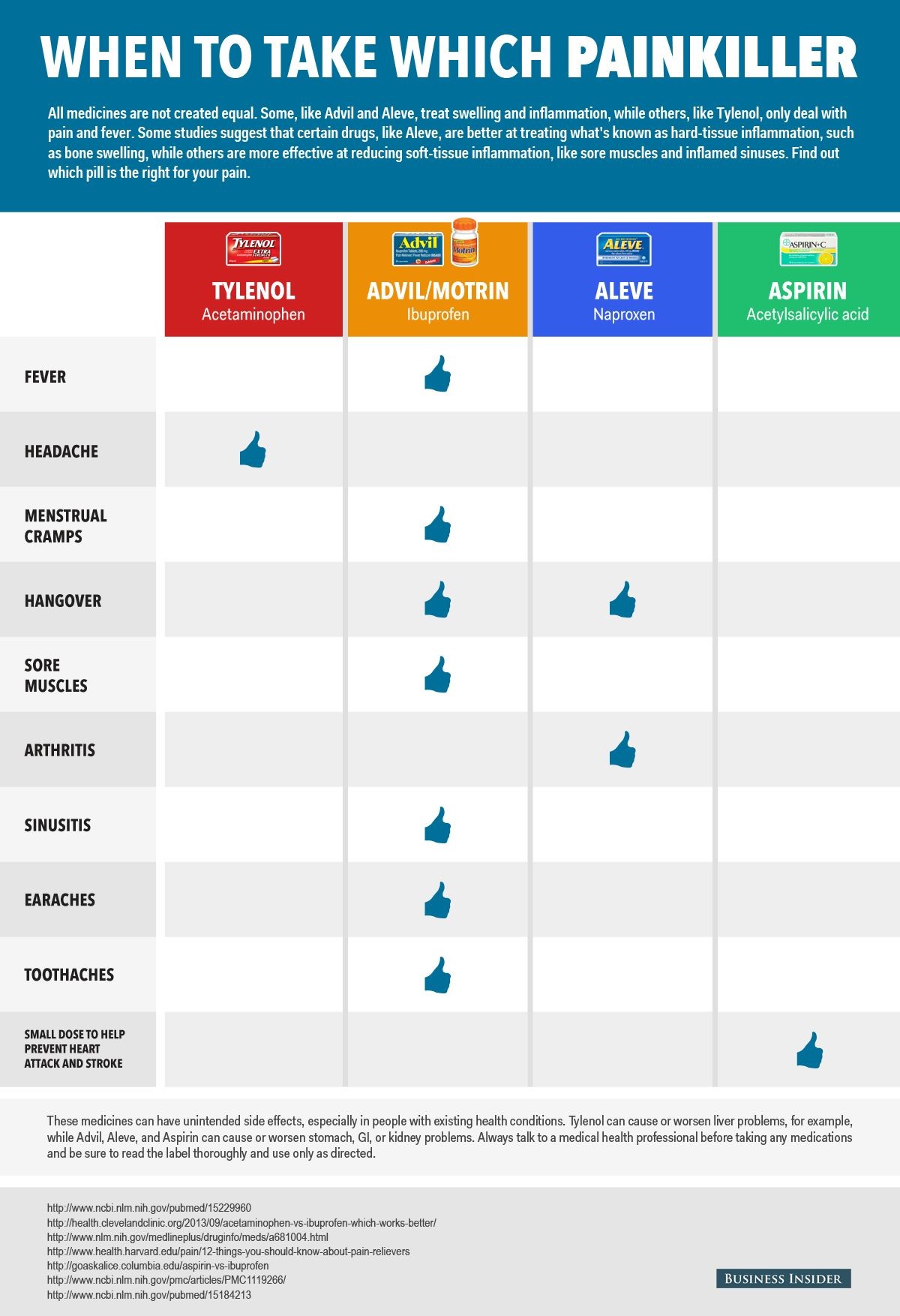
Contents
Aspirin vs. Tylenol (acetaminophen)
Aspirin is a nonsteroidal anti-inflammatory drug (NSAID) used to treat fever, pain, and inflammation in the body. It is also used to prevent blood clots. Other NSAIDs include ibuprofen, indomethacin, and nabumetone. NSAIDs reduce levels of prostaglandins, chemicals that cause pain and inflammation. They work by blocking the enzyme that produces prostaglandins, resulting in lower concentrations and reducing inflammation, pain, and fever. Aspirin also inhibits platelet function, which is why it is used to lower the risk of stroke or heart attack in patients with a history of these conditions.
Tylenol (acetaminophen) is a pain reliever and fever reducer. It works by elevating the pain threshold and reducing fever by affecting the heat-regulating center of the brain.
What are the side effects of aspirin and Tylenol?
Aspirin
Most patients benefit from aspirin and other NSAIDs with minimal side effects. However, serious side effects can occur and are usually dose-related. Therefore, it is advisable to use the lowest effective dose.
The most common side effects of aspirin involve the gastrointestinal system and ringing in the ears. Gastrointestinal side effects include ulcerations, abdominal burning, pain, cramping, nausea, gastritis, and even serious bleeding and liver toxicity. Sometimes, ulceration and bleeding can occur without abdominal pain. Black tarry stools, weakness, and dizziness upon standing may be signs of internal bleeding.
Ringing in the ears indicates that the daily dose should be reduced.
Other side effects include worsening of peptic ulcer disease or kidney function, exacerbation of asthma, increased blood uric acid levels, risk of Reye’s Syndrome in children and teenagers with flu or chickenpox, increased effect of diabetes medications, and mild interference with blood clotting during elective surgery.
Tylenol
When used appropriately, side effects with acetaminophen are rare. The most common side effects are rash, nausea, and headache. Other important side effects include hypersensitivity reactions, serious skin reactions, kidney damage, anemia, and reduced platelets in the blood.
Chronic alcohol use may increase the risk of stomach bleeding. The most serious side effect is liver damage due to large doses, chronic use, or concomitant use with alcohol or other hepatotoxic drugs. Other reported serious side effects include bleeding in the intestines and stomach, angioedema, Stevens-Johnson syndrome, kidney damage, and reduction in white blood cell count.
What is the dosage of aspirin vs. Tylenol?
Aspirin
Aspirin dose ranges from 50 mg to 6000 mg daily depending on the use. Usual doses for mild to moderate pain range from 350 to 650 mg every 4 hours or 500 mg every 6 hours. For rheumatoid arthritis, doses include 500 mg every 4-6 hours, 650 mg every 4 hours, 1000 mg every 4-6 hours, and 1950 mg twice daily. Heart attack prevention doses range from 75 to 325 mg daily. Non-enteric coated aspirin should be chewed immediately when experiencing heart attack symptoms. The dose for preventing another stroke is 75 to 100 mg daily.
Tylenol
The dose for adults is 325 to 650 mg every 4 hours or 500 mg every 8 hours for immediate-release formulations. The dose for extended-release caplets is 1300 mg every 8 hours. The maximum daily dose is 4 grams. The oral dose for children depends on age and weight, with dosing ranging from 10-15 mg/kg every 6-8 hours not exceeding 2.6 g/day for those under 12 years of age, and 40-60 mg/kg/day every 6 hours not exceeding 3.75 g/day for those 12 years and older.
What drugs interact with aspirin and Tylenol?
Aspirin
Aspirin is associated with several suspected or probable drug interactions. NSAIDs may increase blood levels of lithium and reduce the excretion of lithium, leading to lithium toxicity. Aspirin may also reduce the blood pressure-lowering effects of medications for hypertension and increase the levels of methotrexate or aminoglycoside antibiotics, potentially causing more side effects. Individuals taking oral blood thinners or anticoagulants should avoid aspirin to prevent excessive blood thinning and serious bleeding.
Tylenol
Acetaminophen is metabolized by the liver, and drugs that increase the action of liver enzymes that metabolize acetaminophen may reduce its levels and effectiveness. Doses of acetaminophen greater than the recommended doses are toxic to the liver, especially when combined with alcohol or other hepatotoxic drugs. Cholestyramine reduces the effect of acetaminophen by decreasing its absorption from the intestine. Prolonged administration or large doses of acetaminophen should be avoided during warfarin therapy to prevent increased blood thinning effect.
By clicking Submit, I agree to the MedicineNet’s Terms & Conditions & Privacy Policy and understand that I may opt out of MedicineNet’s subscriptions at any time.
Are aspirin and Tylenol safe to use while pregnant and breastfeeding?
Aspirin
Aspirin is generally avoided during pregnancy due to potential adverse effects on the fetus. However, low doses have been safely used for the prevention of pregnancy complications. Aspirin is excreted into breast milk and may cause adverse effects in the infant.
Tylenol
Acetaminophen is excreted in breast milk in small quantities. However, its use by nursing mothers appears to be safe.
From
Pain Management Resources
- Managing a Sickle Cell Pain Crisis
- Take Control of Your Migraine, Now
- Side Effects From aHUS Treatment
Featured Centers
- What Are the Best PsA Treatments for You?
- Understanding Biologics
- 10 Things People With Depression Wish You Knew
Summary
Aspirin and Tylenol (acetaminophen) are used to treat fever and pain in the body. Aspirin is also used to prevent blood clots. Aspirin and Tylenol belong to different drug classes. Aspirin is a nonsteroidal anti-inflammatory drug (NSAID) and Tylenol is an analgesic (pain reliever) and antipyretic (fever reducer).


